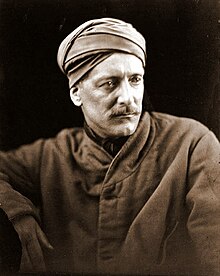Gifford Palgrave

William Gifford Palgrave (
Early life and education
Palgrave was born in
Early overseas travel and conversion to Catholicism
Palgrave went straight from college to India, and served for a time in the 8th Bombay Native Infantry, H.I.C. Shortly after this he became a Roman Catholic, was ordained a priest, joined the order of the Jesuits and served as a member of the order in India, Rome, and in Syria, where he acquired a colloquial command of Arabic.[4]
Palgrave convinced his superiors to support a mission to the interior of
Syria and Middle Eastern travels
Palgrave then returned to Syria, where he assumed the identity of a travelling Syrian physician.
Palgrave became friendly with Najdi ruler Faisal bin Turki while in Najd. Faisal's son and heir apparent, Abdullah, asked Palgrave to get him strychnine.[5] Palgrave believed that Abdullah wanted it to poison his father. Palgrave was accused of espionage and was almost executed for his Christian beliefs.[4]
Later life and death
After travelling for a year from Syria, through Najd, and on to Bahrain and Oman, Palgrave returned to Europe, where he wrote a narrative of his travels. This narrative became a bestseller and has been reprinted many times. It makes no mention of the covert motives for his journey.
After writing this book, Palgrave made yet another volte-face and renounced his vocation as a Jesuit priest in 1865. He then entered the

Besides his work on Central Arabia, Gifford Palgrave published a volume of Essays on Eastern Questions, a narrative called Hermann Agha, a sketch of Dutch Guiana, and a volume of essays titled Ulysses.
References
Footnotes
- ISBN 978-1-4058-8118-0.
- ISBN 978-1-57958-424-5.
- ISBN 9781850431350.
- ^ a b c Personal Narrative of a Year's Journey through Central and Eastern Arabia (1862–63). 1871. Retrieved 24 September 2013 – via World Digital Library.
- ISBN 978-0-333-21471-8.
- ^ "CONSTITUTION de Principaute de Bulgarie. - Tirnovo, April 16/28, 1879". British and foreign state papers 1878 - 1879 (in French). Vol. 70. London. 1886. pp. 1303 - 1318. Retrieved 17 April 2024 – via HathiTrust.
{{cite book}}: CS1 maint: location missing publisher (link)
Sources
- H.V.F. Winstone-- Explorers of Arabia from the Renaissance to the End of the Victorian Era, Allen & Unwin, London, 1978
- Palgrave, W. G.:
- Personal Narrative of a Year's Journey through Central and Eastern Arabia (1862-1863), vol. I, Macmillan & Co., London, 1865 (full text available online, also reprinted many times)
- Personal Narrative of a Year's Journey through Central and Eastern Arabia (1862-1863), vol. II, Macmillan & Co., London, 1866 (full text available online, also reprinted many times)
- The Athenaeum, (No. 3181, October 13, 1888, pp. 483–84).
- This article incorporates text from a publication now in the public domain: Wood, James, ed. (1907). The Nuttall Encyclopædia. London and New York: Frederick Warne.
{{cite encyclopedia}}: Missing or empty|title=(help)
External links
 Media related to William Gifford Palgrave at Wikimedia Commons
Media related to William Gifford Palgrave at Wikimedia Commons- Travels in Arabia from 1892, featuring William Gifford Palgrave
- The Penetration of Arabia: A Record of the Development of Western Knowledge Concerning the Arabian Peninsula from 1904 also features Palgrave
- Works by or about Gifford Palgrave at Internet Archive
